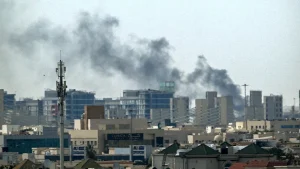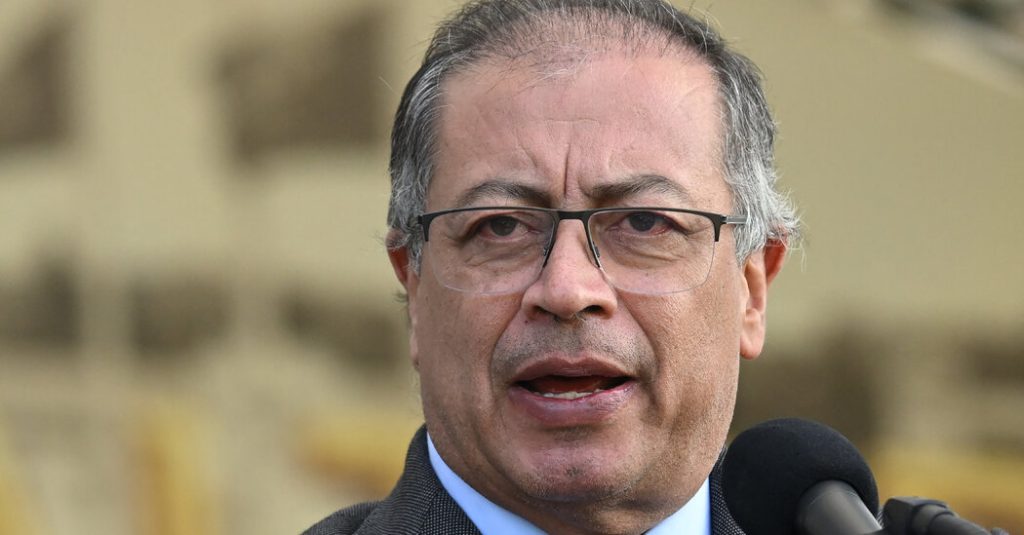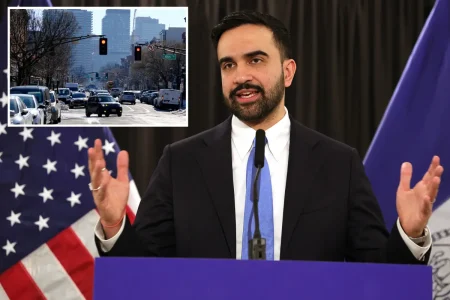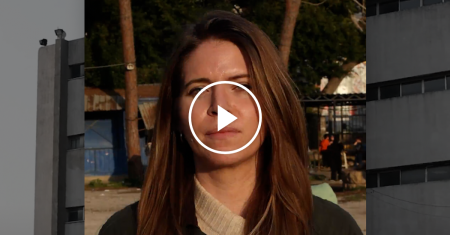Of course! Here’s a concise summary of the content in a conversational, humanized tone, unfolding naturally with all the key details incorporated:
Imagine being at the center of a geopolitical tug-of-war, where high-stakes tension between two long-time allies flares up and reverberates far beyond their borders. That’s precisely the drama unfolding between Colombia and the United States, with immigration policies as the central battleground. In an unprecedented confrontation, Colombia firmly rejected U.S. military aircraft carrying deported citizens, triggering a heated—and highly public—reaction from former President Trump.
On one side, you have Colombia’s leftist president, Gustavo Petro, defending the dignity of deported migrants and rejecting what he viewed as heavy-handed tactics. On the other, Donald Trump, doubling down with swift trade and financial penalties against a country that, up until now, had been one of America’s closest allies in Latin America.
The Flashpoint: Deportation Flights
The spark for this confrontation? U.S. military planes. President Trump recently authorized these aircraft to assist with deportation operations, ramping up efforts to make good on promises of mass deportations of undocumented immigrants. Yet, Colombia wasn’t having it. President Petro made it clear his country would not accept deportees on military flights unless there was a process in place to ensure the migrants were treated “with dignity and respect.” To demonstrate his resolve, Colombia even turned away two U.S. Air Force C-17 planes mid-air, forcing them to return to the U.S.
Petro’s position struck a nerve with the Trump administration, which retaliated fiercely. Trump announced an immediate 25% tariff on all Colombian imports, with plans to increase that to a punishing 50% within a week. He also rolled out sweeping sanctions, revoking visas for Colombian officials and imposing tough restrictions on Colombian banks and financial institutions. The magnitude of these measures was staggering, unprecedented even between such historically aligned nations.
Petro’s Bold Rebuttal
True to his fiery, combative nature, President Petro didn’t hold back. He wasn’t about to let Trump’s moves go unanswered. He fired back with retaliatory tariffs of his own on U.S. imports. But it wasn’t just the economic backlash that made headlines—it was his words. Taking to social media, Petro accused Trump of undermining Colombia’s autonomy. “You don’t like our freedom, fine,” he wrote. In a brash, provocative tone, he added, “I do not shake hands with white enslavers.”
Petro pushed the conversation further, pointing out that Colombia wasn’t the only country questioning Trump’s deportation approach. He referenced Brazil, where deportees recently arrived on military flights in shackles. Some of those deportees alleged mistreatment, including being denied water and bathroom access in flight. This raised broader concerns across Latin America, where responses to the U.S.’s mass deportation efforts have been hesitant, to say the least.
A Risky Game for Both Sides
The brewing showdown isn’t without risks for either leader. For Trump, the decision to wage a trade and sanctions war is bold, considering Colombia has long been one of the U.S.’s top allies in the region. As Will Freeman from the Council on Foreign Relations put it, the U.S.-Colombia relationship has been one of the deepest and most strategic partnerships in Latin America for decades. Yet Trump’s move to escalate tensions carries potential costs—primarily economic—for both parties.
On Colombia’s end, Petro’s decision to defy the U.S. is equally risky. America remains Colombia’s largest trading partner, with trade totaling $53.5 billion in 2022. The U.S. imports Colombian goods like oil, coffee, and flowers while exporting agricultural products like pork and dairy. The U.S.’s planned tariffs could deliver a sharp blow to Colombia’s exports, while sanctions on its financial system could create further economic challenges.
Still, as Freeman observed, Petro’s defiance might also reflect his own capabilities as a savvy political gambler. Petro knows he has domestic support for pushing back against the U.S. if he frames it as a stance for sovereignty and human dignity, especially amid frustration over perceived economic inequalities between the nations.
A New Chapter in U.S.-Colombia Relations
This feud represents a sharp turn in U.S.-Colombia relations, which have traditionally been close, at least on paper. Colombia has often cooperated on U.S.-led initiatives, particularly in counternarcotics efforts. Even under Petro, critics note that deportation flights from the U.S. to Colombia were accepted regularly before this latest stand-off. What makes this situation so striking is not only Petro’s refusal to cooperate but also his willingness to call out the U.S. in such unfiltered terms.
Petro, Colombia’s first-ever leftist president, is no stranger to standing firm on controversial issues. As a former guerrilla fighter turned senator, he has built a career on taking on the establishment, defending human rights, and critiquing global inequalities. However, his unorthodox approach has ruffled feathers both at home and internationally. Critics accuse him of being impulsive, unwilling to take counsel from advisors, and too willing to act before deliberation.
Yet, some argue that Petro’s fiery rhetoric and bold moves reflect legitimate grievances, particularly regarding global power imbalances. His emphasis on treating deportees with “dignity and respect” also speaks to broader questions about how countries handle migration in a time of mass displacement.
What Happens Next?
This public face-off between Trump and Petro has put other Latin American countries in the hot seat. Guatemala, for instance, has quietly accepted military deportation flights, as evidenced by two U.S. jets carrying 160 deportees landing there recently. Mexico, despite serving as the origin country for the largest number of unauthorized immigrants in the U.S., has been more circumspect. While continuing to accept deportees, Mexican officials have remained tight-lipped about authorizing military flights.
Trump’s gamble—and Petro’s counter-move—will likely set a precedent for how other nations respond to the U.S.’s aggressive deportation plans. Will they follow in Colombia’s footsteps and stiff-arm military flights, or will they acquiesce to avoid economic fallout?
The Stakes for Both Nations
Underlying this fight are broader questions about migration, sovereignty, and power. For the U.S., Trump’s approach raises ethical and diplomatic concerns that go beyond logistics. Does treating undocumented immigrants as a security threat by deporting them on military planes exacerbate tensions with key allies?
For Petro, the challenge lies in whether his defiance will enhance his domestic standing or backfire economically. His bold stance might resonate with Colombians frustrated by years of inequality and dependency on the U.S., but can he afford to damage a relationship so vital to Colombia’s economy?
Amid this clash, Petro also highlighted another oft-overlooked aspect of U.S.-Colombian migration: the Americans living undocumented in Colombia. He accused over 15,000 U.S. citizens of overstaying their welcome and urged them to legalize their status. It was a pointed reminder that migration issues cut both ways and that no country is immune to questions about borders and belonging.
Big Impact, Uncertain Future
This moment is likely to be remembered as a turning point, not just for U.S.-Colombian relations but also for how countries work together—or clash—on migration challenges. Both Trump and Petro are doubling down on high-stakes strategies, and the ripple effects are just beginning to unfold.
Between fiery speeches, policy shifts, and economic gambits, one thing is clear: the issue of migration, often framed as a simple problem of borders and enforcement, is as much about relationships, respect, and sovereignty as it is about logistics. As this saga continues, the world waits to see where these two nations—and others—will draw the line.
This summary weaves together the major points, framing the conflict as a complex and human story while preserving all the key details.










